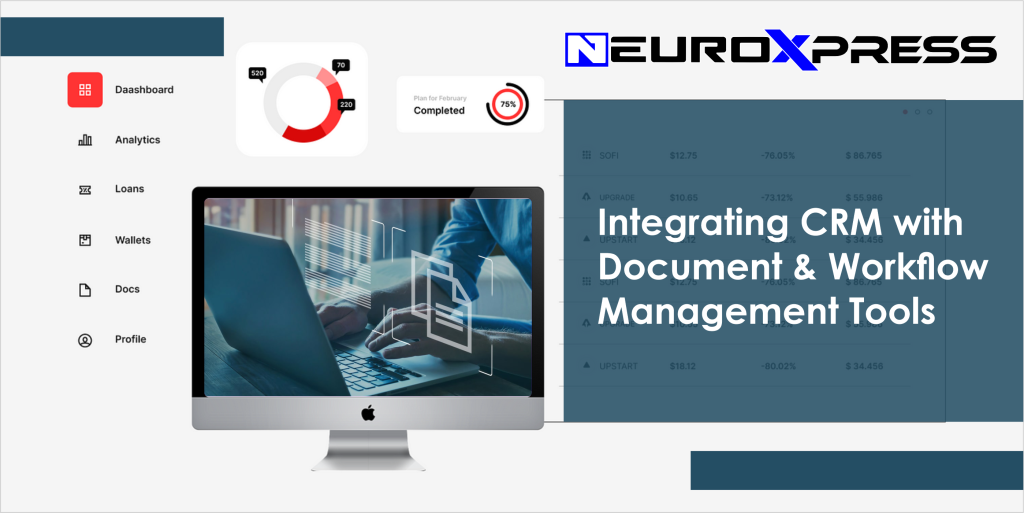Integrating CRM with Document & Workflow Management Tools: Optimizing Investment Banking Operations

Introduction: Why Integration Matters in Investment Banking
In the high-stakes world of investment banking, where every minute counts and deals hinge on seamless coordination, technology is more than a tool—it’s the engine that drives operational excellence. Among the most transformative combinations in this arena is integrating CRM with document and workflow management tools. This integration streamlines communication, ensures regulatory compliance, and empowers teams with real-time data visibility.
Imagine a deal team working on a multi-billion-dollar M&A transaction. Without integration, client data is stored in the CRM, while documents live in a separate repository, and workflows are managed manually through endless email threads. The potential for miscommunication, version control issues, and compliance risks is immense. Now, imagine that same team operating on an integrated platform—documents are linked to CRM entries, automated workflows route tasks to the right people, and everyone sees updates in real time. That’s not just efficiency; it’s a competitive advantage.
In this article, we’ll explore how integrating CRM with document and workflow management tools transforms investment banking operations, from managing due diligence to tracking client communications and deal progress.
Understanding the Integrating CRM with Document & Workflow Management Tools
What is CRM Integration?
CRM integration refers to connecting your Customer Relationship Management system with other business tools—like document storage, workflow automation platforms, email, and analytics—so that all systems work in harmony.
Benefits for Investment Bankers:
- Elimination of redundant data entry
- Real-time access to client and deal information
- Enhanced data security and compliance
- Increased visibility into workflow bottlenecks
- Seamless collaboration across departments
How Document Management Tools Add Value
Key Features to Look for:
- Version control and audit trails
- Secure sharing and permission settings
- Real-time collaboration on confidential files
- Metadata tagging and document search
Common Tools Integrated:
- Microsoft SharePoint
- Google Drive with enterprise-grade encryption
- Dropbox Business
- Box
Benefits:
- Centralized document storage
- Reduced risk of data loss or unauthorized access
- Faster due diligence and client onboarding
The Role of Workflow Management in Investment Banking
Workflow tools automate repetitive tasks and ensure that nothing falls through the cracks. These tools are essential in managing the lifecycle of deals, compliance checks, and communication approval processes.
Features that Matter:
- Task automation and routing
- Custom approval flows
- Notifications and deadline alerts
- Visual dashboards
Popular Workflow Tools:
- Monday.com
- Asana
- Smartsheet
- Nintex (for enterprise compliance workflows)
Benefits of CRM + Document & Workflow Integration
| Benefit | Description |
|---|---|
| Centralized Data | All documents, tasks, and client communications in one place |
| Enhanced Compliance | Audit trails and controlled access for regulatory requirements |
| Efficiency | Reduced manual effort through automation |
| Faster Deal Execution | Real-time updates and collaboration accelerate progress |
| Improved Client Experience | Consistent communication and quick response times |
Real-World Use Case: Mid-Market M&A Team
Before Integration:
- CRM (Salesforce) used for client data
- Documents stored in local drives
- Task management done through spreadsheets
After Integration:
- Salesforce integrated with SharePoint and Monday.com
- All deal-related docs are linked to CRM entries
- Automated workflows notify legal/compliance for review
Results:
- 30% faster due diligence process
- Zero compliance breaches in 12 months
- Improved internal accountability and collaboration
Comparison Table: CRM Integration Tools
| Software | Document Management | Workflow Automation | Compliance Features | Investment Banking Focus |
|---|---|---|---|---|
| Salesforce + Box + Nintex | ✅ | ✅ | ✅ | High |
| HubSpot + Google Drive + Asana | ✅ | ✅ | ⚠️ | Medium |
| Microsoft Dynamics + SharePoint + Power Automate | ✅ | ✅ | ✅ | High |
Pros & Cons Table
| Feature | Pros ✅ | Cons ❌ |
|---|---|---|
| Salesforce Integration | Enterprise-grade compliance and security | High cost and complex setup |
| HubSpot Integration | Easy to use and affordable | Limited compliance controls |
| Microsoft Stack | Seamless ecosystem | Requires Office 365 subscription |
Summary Diagram: Integration Benefits Snapshot
| Key Area | With Integration | Without Integration |
|---|---|---|
| Document Access | Centralized and secure | Fragmented and inconsistent |
| Task Tracking | Automated with alerts | Manual and error-prone |
| Client Experience | Personalized and responsive | Slow and inconsistent |
| Deal Speed | Accelerated | Delayed |
| Compliance | Strong audit trails | High risk of breaches |
Conclusion: CRM Integration is the Future of Investment Banking Ops
Integrating CRM with document and workflow management tools is not just a tech upgrade—it’s a strategic move for investment banks looking to gain operational agility, improve compliance, and deliver better client experiences. Whether you’re managing investor relations, due diligence, or regulatory reporting, integration helps your team move faster and smarter.
Explore integration-ready CRM platforms like Salesforce, Microsoft Dynamics, or HubSpot to start transforming your operations today.